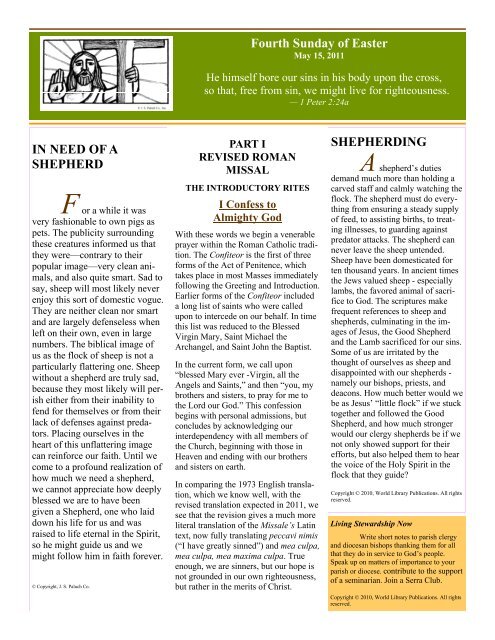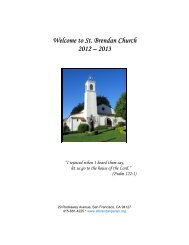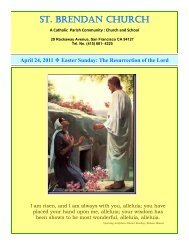Fourth Sunday of Easter - St. Brendan Parish
Fourth Sunday of Easter - St. Brendan Parish
Fourth Sunday of Easter - St. Brendan Parish
You also want an ePaper? Increase the reach of your titles
YUMPU automatically turns print PDFs into web optimized ePapers that Google loves.
<strong>Fourth</strong> <strong>Sunday</strong> <strong>of</strong> <strong>Easter</strong><br />
May 15, 2011<br />
He himself bore our sins in his body upon the cross,<br />
so that, free from sin, we might live for righteousness.<br />
— 1 Peter 2:24a<br />
IN NEED OF A<br />
SHEPHERD<br />
F or a while it was<br />
very fashionable to own pigs as<br />
pets. The publicity surrounding<br />
these creatures informed us that<br />
they were—contrary to their<br />
popular image—very clean animals,<br />
and also quite smart. Sad to<br />
say, sheep will most likely never<br />
enjoy this sort <strong>of</strong> domestic vogue.<br />
They are neither clean nor smart<br />
and are largely defenseless when<br />
left on their own, even in large<br />
numbers. The biblical image <strong>of</strong><br />
us as the flock <strong>of</strong> sheep is not a<br />
particularly flattering one. Sheep<br />
without a shepherd are truly sad,<br />
because they most likely will perish<br />
either from their inability to<br />
fend for themselves or from their<br />
lack <strong>of</strong> defenses against predators.<br />
Placing ourselves in the<br />
heart <strong>of</strong> this unflattering image<br />
can reinforce our faith. Until we<br />
come to a pr<strong>of</strong>ound realization <strong>of</strong><br />
how much we need a shepherd,<br />
we cannot appreciate how deeply<br />
blessed we are to have been<br />
given a Shepherd, one who laid<br />
down his life for us and was<br />
raised to life eternal in the Spirit,<br />
so he might guide us and we<br />
might follow him in faith forever.<br />
© Copyright, J. S. Paluch Co.<br />
PART I<br />
REVISED ROMAN<br />
MISSAL<br />
THE INTRODUCTORY RITES<br />
I Confess to<br />
Almighty God<br />
With these words we begin a venerable<br />
prayer within the Roman Catholic tradition.<br />
The Confiteor is the first <strong>of</strong> three<br />
forms <strong>of</strong> the Act <strong>of</strong> Penitence, which<br />
takes place in most Masses immediately<br />
following the Greeting and Introduction.<br />
Earlier forms <strong>of</strong> the Confiteor included<br />
a long list <strong>of</strong> saints who were called<br />
upon to intercede on our behalf. In time<br />
this list was reduced to the Blessed<br />
Virgin Mary, Saint Michael the<br />
Archangel, and Saint John the Baptist.<br />
In the current form, we call upon<br />
“blessed Mary ever -Virgin, all the<br />
Angels and Saints,” and then “you, my<br />
brothers and sisters, to pray for me to<br />
the Lord our God.” This confession<br />
begins with personal admissions, but<br />
concludes by acknowledging our<br />
interdependency with all members <strong>of</strong><br />
the Church, beginning with those in<br />
Heaven and ending with our brothers<br />
and sisters on earth.<br />
In comparing the 1973 English translation,<br />
which we know well, with the<br />
revised translation expected in 2011, we<br />
see that the revision gives a much more<br />
literal translation <strong>of</strong> the Missale’s Latin<br />
text, now fully translating peccavi nimis<br />
(“I have greatly sinned”) and mea culpa,<br />
mea culpa, mea maxima culpa. True<br />
enough, we are sinners, but our hope is<br />
not grounded in our own righteousness,<br />
but rather in the merits <strong>of</strong> Christ.<br />
SHEPHERDING<br />
A shepherd’s duties<br />
demand much more than holding a<br />
carved staff and calmly watching the<br />
flock. The shepherd must do everything<br />
from ensuring a steady supply<br />
<strong>of</strong> feed, to assisting births, to treating<br />
illnesses, to guarding against<br />
predator attacks. The shepherd can<br />
never leave the sheep untended.<br />
Sheep have been domesticated for<br />
ten thousand years. In ancient times<br />
the Jews valued sheep - especially<br />
lambs, the favored animal <strong>of</strong> sacrifice<br />
to God. The scriptures make<br />
frequent references to sheep and<br />
shepherds, culminating in the images<br />
<strong>of</strong> Jesus, the Good Shepherd<br />
and the Lamb sacrificed for our sins.<br />
Some <strong>of</strong> us are irritated by the<br />
thought <strong>of</strong> ourselves as sheep and<br />
disappointed with our shepherds -<br />
namely our bishops, priests, and<br />
deacons. How much better would we<br />
be as Jesus’ “little flock” if we stuck<br />
together and followed the Good<br />
Shepherd, and how much stronger<br />
would our clergy shepherds be if we<br />
not only showed support for their<br />
efforts, but also helped them to hear<br />
the voice <strong>of</strong> the Holy Spirit in the<br />
flock that they guide<br />
Copyright © 2010, World Library Publications. All rights<br />
reserved.<br />
Living <strong>St</strong>ewardship Now<br />
Write short notes to parish clergy<br />
and diocesan bishops thanking them for all<br />
that they do in service to God’s people.<br />
Speak up on matters <strong>of</strong> importance to your<br />
parish or diocese. contribute to the support<br />
<strong>of</strong> a seminarian. Join a Serra Club.<br />
Copyright © 2010, World Library Publications. All rights<br />
reserved.





